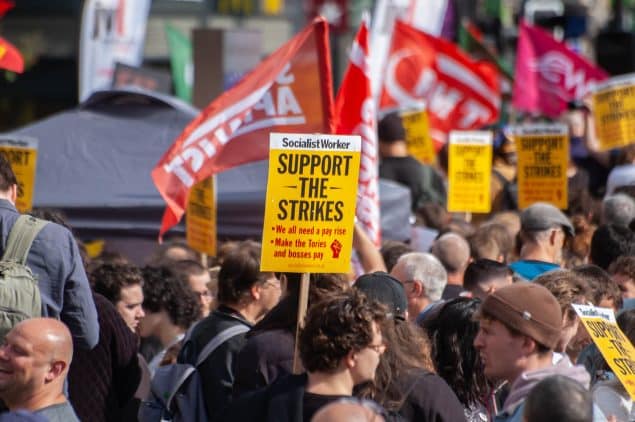Home » UK Business & Employment News • UK Business News • UK Employment news » RMT union announces three days of walkouts in July
RMT union announces three days of walkouts in July
https://www.whatjobs.com/news/united-kingdom/uk-business-news/rmt-union-announces-three-days-of-walkouts-in-july

The RMT union has declared thousands of rail workers will go on strike for three days in July, escalating a long-standing dispute concerning pay and working conditions.
The strikes are scheduled for July 20, 22, and 29 and will affect 14 rail firms.
The RMT stated negotiations with both rail companies and the government have reached an impasse.
Read More: Network Rail RMT members vote to accept new pay offer
However, train operators have deemed the strikes "completely unnecessary" and have urged the union to present the latest pay offer to its members.
Previous strikes related to the dispute have caused widespread disruptions.
The unions are demanding higher pay to match the rapidly rising cost of living, but rail firms have insisted they will not increase wages without concessions on conditions.
Read More: RMT union suspends Network Rail strikes later this month after new pay offer
The RMT announced approximately 20,000 of its members, including guards, train managers, and station staff, will participate in the walkouts after train operators failed to provide a new offer.
Mick Lynch, the general secretary of the RMT, criticized the lack of effort from train operators and the government to arrange meetings or make a reasonable offer to resolve the dispute.
He said: "The government continues to shackle the companies and will not allow them to put forward a package that can settle this dispute."
He also accused the government of hindering the companies from presenting a settlement package.
Read More: More rail strikes on the way as RMT rejects eight percent pay rise
The chosen strike dates coincide with significant sporting events, including the fourth and fifth Ashes Tests and The Open golf championship.
Unions argue any pay offer should reflect the rising cost of living, with inflation currently standing at 8.7 percent.
The latest pay offer from the Rail Delivery Group, representing train operators, involved a backdated pay rise of five percent for 2022.
Read More: Aslef train drivers’ overtime ban to cause further rail disruption
However, unions would need to accept reforms before members could receive a second year's pay rise of 4 percent negotiated with individual operators.
While rail operators are open to negotiation with the RMT, they insist the union should first present the latest pay offer to its members before taking further action.
The Rail Delivery Group criticized the strikes as "completely unnecessary" and noted the RMT has caused its members to lose more money through strikes than they would have gained from pay offers.
A spokesperson said: "We have now made three offers that the RMT executive have blocked without a convincing explanation."
Read More: Rail strikes to cause chaos for FA Cup final and Epsom Derby fans
The group expressed frustration over the rejection of three offers without a compelling explanation from the RMT executive.
The strikes, targeting two significant international sporting events, have drawn criticism from the Department for Transport, which stated they would disrupt families during the start of the school summer holidays.
The government has supported train operators in presenting "fair and reasonable pay offers" include substantial increases for rail workers.
Need Career Advice? Get employment skills advice at all levels of your career
The spokesperson urged union leaders to allow their members to vote on these offers.
The announcement of strikes coincided with Bank of England governor Andrew Bailey's statement wage rises must not continue at their current pace if inflation is to decrease, aligning with the Bank's call for restraint from workers.
The rail strikes have dealt a severe blow to the hospitality industry, including pubs, bars, and restaurants.
UK Hospitality, an industry group, estimated strike disruptions over the past year have already cost the sector £3.25 billion in lost sales, and this figure is expected to rise due to the upcoming strike days.
Kate Nicholls, CEO of UK Hospitality, expressed concerns over the impact on businesses.
Follow us on YouTube, Twitter, LinkedIn, and Facebook














